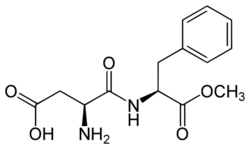Aspartame
(drug, carcinogen?) | |
|---|---|
 | |
| Start | 1965 |
| Widely used artificial sweetener with increasingly suspect looking health effects. | |
Aspartame is a drug that was first made in 1965. It is widely used as a sugar-free sweetener worldwide. It has been banned twice by the FDA, but re-legalised after heavy lobbying. Although dozens of studies have linked aspartame to serious health problems, its safety is a continued subject of debate. In July 2023 the International Agency for Research on Cancer listed it as "possibly carcinogenic to humans".[1]
Official narrative
A panel of experts set up by the European Food Safety Authority concluded in 2013 that aspartame is safe for human consumption at current levels of exposure.[2] Evidence does not suggest that aspartame assists in weight loss or diabetes.[3]
History
Aspartame was approved by the FDA in 1974, but after discovery of problems with Searle's safety testing program, including testing of aspartame, approval was rescinded in 1975.
"In January of 1981 Donald Rumsfeld, CEO of Searle, stated in a sales meeting that he was going to “call in his markers” and make a push to get aspartame approved."[4] That month Ronald Reagan was sworn in as US President. His transition team included Rumsfeld who picked Dr. Arthur Hull Hayes Jr. to be the new FDA Commissioner. Hayes appointed a 5-person Scientific Commission to review the claims on aspartame, which voted 3 – 2 decision that the artificial sweetener was unsafe. However approval was granted in 1981.[4]
Safety
The safety of aspartame is a matter of ongoing research. Wikipedia has a page devoted to the "controversy", which highlights flaws in safety research suggesting that aspartame use carries a long term health risk.
Dozens of studies have linked aspartame to serious health problems, including cancer[5], cardiovascular disease[6], Alzheimer’s disease[7], seizures[8], stroke and dementia[9], as well as negative effects such as intestinal dysbiosis[10], mood disorders[11], headaches and migraines[12]. Evidence also links aspartame to weight gain, increased appetite and obesity-related diseases[13]. The Washington Post reported in 2017 that a "new study shows an association between diet soda and both stroke and dementia".[14]
Gregory Gordon
In 1987, UPI published a series of investigative articles by Gregory Gordon reporting on these concerns, including early studies linking aspartame to health problems, the poor quality of industry-funded research that led to its approval, and the revolving-door relationships between FDA officials and the food industry. Gordon’s series is an invaluable resource for anyone seeking to understand the history of aspartame/NutraSweet:
- Did Searle Ignore Early Warning Signs? (10/12/87)
- Seizure, Blindness Victims Point to NutraSweet. (10/12/87)
- What the Critics Say about NutraSweet. (10/12/87)
- NutraSweet Approval Marred by Controversy. (and part 2) (10/13/87)
- Maverick Scientist at Center of NutraSweet Controversy. (10/13/87)
- Sweet Corporate Victories. (10/14/87)
References
- ↑ https://www.reuters.com/business/healthcare-pharmaceuticals/whos-cancer-research-agency-say-aspartame-sweetener-possible-carcinogen-sources-2023-06-29/
- ↑ http://www.efsa.europa.eu/en/efsajournal/pub/3496.htm
- ↑ https://www.ncbi.nlm.nih.gov/pmc/articles/PMC5515645 pages=E929–E939
- ↑ a b https://dailyhealthpost.com/the-shocking-story-of-how-aspartame-became-legal/
- ↑ https://usrtk.org/sweeteners/aspartame_health_risks/#cancer
- ↑ https://usrtk.org/sweeteners/aspartame_health_risks/#cancer
- ↑ https://usrtk.org/sweeteners/aspartame_health_risks/#dementia
- ↑ https://usrtk.org/sweeteners/aspartame_health_risks/#seizures
- ↑ https://usrtk.org/sweeteners/aspartame_health_risks/#dementia
- ↑ https://usrtk.org/sweeteners/aspartame_health_risks/#dementia
- ↑ https://usrtk.org/sweeteners/aspartame_health_risks/#neurotoxicity
- ↑ https://usrtk.org/sweeteners/aspartame_health_risks/#headaches
- ↑ https://usrtk.org/sweeteners/aspartame_health_risks/#intestinal
- ↑ https://www.washingtonpost.com/news/morning-mix/wp/2017/04/21/study-links-diet-soda-to-higher-risk-of-stroke-dementia/